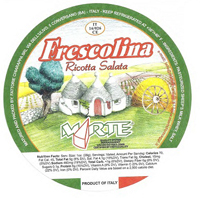Multistate Outbreak of Listeriosis Linked to Imported Frescolina Brand Ricotta Salata Cheese
Recall
On September 10, 2012, Forever Cheese, Inc. voluntarily recalled one lot of Frescolina brand ricotta salata cheese due to Listeria monocytogenes contamination.
The recalled cheese was sold to distributors for retailers and restaurants in California, Colorado, District of Columbia, Florida, Georgia, Illinois, Indiana, Maine, Maryland, Massachusetts, Montana, New Jersey, New Mexico, New York, Ohio, Oregon, Pennsylvania, Virginia, and Washington between June 20, 2012 and August 9, 2012.
The recall affects lot number T9425 and/or production code 441202. Products were sold to supermarkets, restaurants and wholesale distributors.
Advice to Consumers

Imported Frescolina Brand Ricotta Salata Cheese
Contaminated ricotta salata cheese has made people sick.
- CDC recommends that consumers not eat imported Frescolina brand ricotta salata cheese. This is especially important for pregnant women, persons with weakened immune systems, and older adults.
- Even if some of the cheese has been eaten without anyone becoming ill, the rest of the cheese should be disposed of immediately.
- When in doubt, throw it out. (See disposal recommendations below)
How do I recognize the contaminated cheese?
- The recalled cheese is labeled Frescolina brand ricotta salata cheese. It is a product of Italy. Consumers should consult with their retailer if they have questions about the origin of cheese.
- Be aware that the recalled cheese has a 4 month shelf life, so contaminated cheese may still be in consumer’s refrigerators and may still be for sale in stores.
- Ricotta salata cheese is often served crumbled or grated as an ingredient in some dishes.
- Ricotta salata is a salty white cheese made from pasteurized sheep’s milk. Note: It is not the same as ricotta cheese, which is a very soft cheese often sold in plastic tubs.
Contaminated cheese may still be in consumers' homes.
Listeria can grow in cut cheese at room and refrigerator temperatures. Listeria can also spread to other cheeses cut and served on the same cutting board or stored in the same area.
- Follow these simple steps if recalled cheese is or was in your home:
- Dispose of cheese in a closed plastic bag placed in a sealed trash can. This will prevent people and animals from eating it.
- Wash the cheese drawer and other areas where the cheese was stored in the refrigerator with hot water and soap. Sanitize the area with a solution of one tablespoon of chlorine bleach to one gallon of hot water.
- Wash cutting boards, surfaces, and utensils used to cut, serve, or store cheese. If possible, use a dishwasher; otherwise, use hot water and soap, followed by sanitizing with a dilute bleach solution described above.
- Wash hands with warm water and soap following the cleaning and sanitation process.
Who is most at risk?
- Listeriosis primarily affects pregnant women and their newborn infants, persons with weakened immune systems, and older adults.
- Persons who think they might have become ill from eating contaminated cheese should consult their doctor immediately. People can sometimes develop listeriosis even up to two months after eating contaminated food.
More information about the recalled cheese is available here.
For more information about listeriosis and recommendations to reduce your risk of getting sick go to CDC's Listeriosis webpage on prevention.
Advice to Cheese Retailers and Establishments
Contaminated cheese may still be in stores and restaurants.
Listeria can grow in cut cheese at room and refrigerator temperatures. Listeria can also spread to other cheeses cut and served on the same cutting board or stored in the same area.
- Do not sell or serve recalled Frescolina brand ricotta salata cheese distributed by Forever Cheese, Inc. If you do not know the source of your ricotta salata cheese, check with your supplier.
- Dispose of recalled cheese.
- Wash and sanitize cheese display cases and refrigerators where contaminated cheese was stored.
- Wash and sanitize cutting boards, surfaces, and utensils used to cut, serve, or store contaminated cheese.
- Wash hands with warm water and soap following the cleaning and sanitation process.
Contact Us:
- Centers for Disease Control and Prevention
1600 Clifton Rd
Atlanta, GA 30333 - 800-CDC-INFO
(800-232-4636)
TTY: (888) 232-6348 - New Hours of Operation
8am-8pm ET/Monday-Friday
Closed Holidays - cdcinfo@cdc.gov


